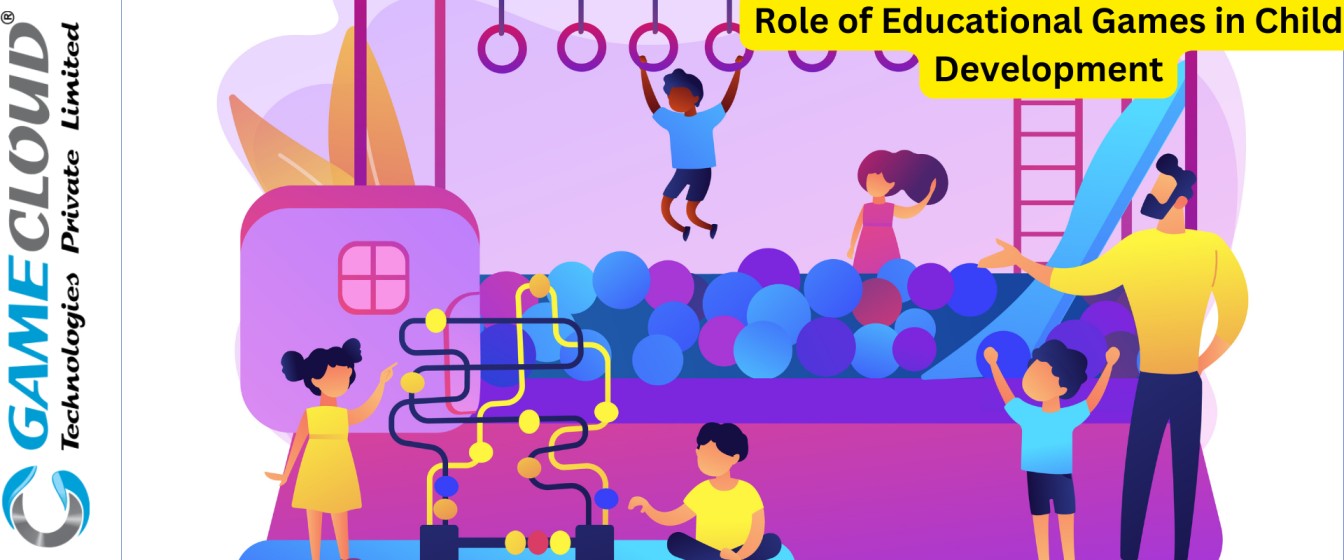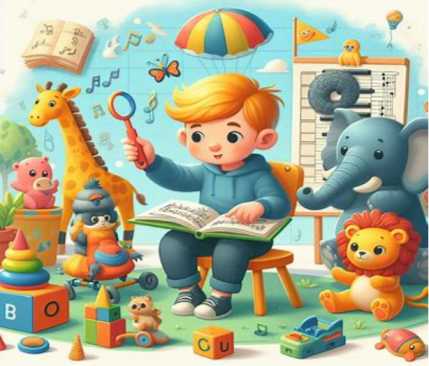
Educational games have become an integral part of early childhood education, offering a unique approach to learning that is both engaging and effective. These games not only teach essential knowledge from alphabets and numbers to advanced topics but also play a crucial role in developing the brain and mental reflexes of children. In this article, we will explore the benefits of educational games, highlighting their impact on cognitive, social, and emotional development, as well as the importance of careful game selection and teacher training.
Constructivist Theory and its Relationship to Educational Games
Constructivist theory is an approach to education that emphasises the importance of the learner’s own experiences and interactions in the learning process. It posits that learning is an active process where students construct their own knowledge through hands-on experiences and reflection. The role of the teacher in constructivism is to facilitate this process rather than simply imparting information. Swiss psychologist Jean Piaget is considered the originator of this theory, with other significant contributors including John Dewey, Lev Vygotsky, Robert M. Gagné, and Jerome Bruner.
In the context of educational games, constructivism aligns well with the interactive and experiential nature of games. Games provide active experiences where students can learn by doing, engaging with content, making decisions, and reflecting on outcomes. Educational games offer a platform for students to construct their own knowledge by interacting with the game environment, solving problems, and applying concepts in a practical setting. This hands-on approach to learning mirrors the principles of constructivist theory, where learners are actively engaged in the learning process and play a central role in constructing their understanding.
Therefore, educational games serve as a powerful tool that complements constructivist theory by providing students with opportunities to engage in experiential learning, problem-solving, and reflection. By immersing students in interactive game environments, educational games promote active learning, critical thinking, and the construction of knowledge based on students’ experiences and interactions within the game.
Some examples of educational games that align with constructivist theory include:
- Scratch: A programming language and online community where students can create interactive stories, games, and animations. Scratch allows students to build their own projects, encouraging creativity and problem-solving skills.
- Minecraft: A sandbox video game that allows players to build and explore virtual worlds. Minecraft promotes creativity, collaboration, and critical thinking as players construct their own structures and solve challenges within the game environment.
- Eco: An ecosystem simulation game where players work together to build a civilization while maintaining a balanced ecosystem. Eco encourages players to consider the environmental impact of their actions and fosters an understanding of complex systems.
These games provide hands-on experiences, promote active learning, and allow students to construct their own knowledge through exploration and problem-solving, aligning well with the principles of constructivist theory.
Cognitive Benefits of Educational Games
Educational games can improve coordination in children by engaging them in activities that require physical movement and interaction, thereby enhancing their motor skills, balance, and spatial awareness. These games provide a fun and interactive way for children to develop coordination through activities like climbing, crawling, bending, stretching, and playing catch. By participating in these games, children can grow their balance, coordination, strength, and confidence, ultimately leading to better physical development and motor skills. For example, action games have been found to improve visual details, visual contrast, and multitasking abilities, which are essential for everyday life. Additionally, 3D games have been shown to improve the functioning of the hippocampus, a part of the brain involved in learning and memory.

here are the key cognitive benefits of educational games for children:
- Improved Cognitive Skills: Educational games have been shown to enhance cognitive abilities like problem-solving, critical thinking, and spatial reasoning. They challenge children’s brains and improve skills like focus, multitasking, and information processing.
- Enhanced Memory and Attention: Educational games can improve memory, both short-term and long-term, as well as attention span and concentration. The interactive nature of games engages the brain and promotes better retention of information.
- Developed Cognitive Flexibility: Playing educational games helps children develop cognitive flexibility, allowing them to adapt to changing game demands and think from different perspectives.
- Promoted Neuroplasticity: Educational games can positively impact brain development and neuroplasticity, the brain’s ability to form new connections. This can lead to improved cognitive performance in various areas.
- Improved Academic Performance: By enhancing cognitive skills, memory, and attention, educational games can contribute to better academic performance in subjects like mathematics, science, and coding.
In summary, the significant cognitive benefits of educational games are highlighted, including improved problem-solving, memory, attention, cognitive flexibility, and neuroplasticity, all of which can positively impact a child’s overall academic and cognitive development.
Impact on Brain Development
Research has demonstrated that educational games have a profound impact on brain development, influencing cognitive abilities, brain function, and brain structure. Through engaging with specific neurocognitive demands and educationally relevant learning experiences, these games play a crucial role in promoting brain health and enhancing various aspects of cognitive development.
- Cognitive Abilities: Educational games challenge the brain with specific neurocognitive demands, such as executive control, problem-solving, and critical thinking. By engaging in these cognitive tasks, players exercise and enhance their cognitive abilities, leading to improved mental processes like attention, memory, and decision-making.
- Brain Function: The interactive nature of educational games stimulates brain function by requiring players to actively participate in learning tasks. This engagement triggers neural activity, promoting the development of neural networks associated with cognitive skills and problem-solving. This enhanced brain function contributes to improved cognitive performance and mental agility.
- Brain Structure: Educational games have the potential to impact brain structure by fostering neuroplasticity, the brain’s ability to adapt and reorganise itself in response to learning experiences. Through repeated engagement with cognitive challenges and educational content, players can strengthen neural connections, leading to structural changes that support enhanced cognitive abilities and brain health.
- Neurocognitive Approach: Researchers advocate for a neurocognitive approach to identify and develop educational games that optimise brain health. This approach involves conducting cognitive task analyses of games to understand their specific neurocognitive demands and validating their effectiveness through objective methods. By selecting games that challenge cognitive abilities and promote educational learning experiences, researchers aim to enhance brain health markers like cognitive ability, brain function, and brain structure.
- Long-Term Impact: Educational games, when rigorously tested in randomised controlled clinical trials, have the potential to yield long-term benefits for brain development. By providing a platform for cognitive stimulation, problem-solving, and interactive learning experiences, these games can contribute to sustained improvements in cognitive abilities, brain function, and brain structure over time.
Educational games offer a unique opportunity to positively impact brain development by engaging players in cognitive challenges, promoting brain function, and fostering structural changes in the brain. Through a neurocognitive approach and rigorous research, the potential of educational games to enhance brain health and cognitive abilities is being explored, paving the way for innovative strategies to support cognitive development in children and individuals of all ages.

Social and Emotional Development through Games
The sources provided highlight the importance of using games to teach social and emotional skills to children and young adults. Games can be a powerful tool for introducing and reinforcing critical social-emotional learning skills, such as self-awareness, positive relationships, empathy, emotion management, self-control, conflict resolution, and decision-making. By incorporating these skills into games, educators can make learning meaningful, interactive, hands-on, and enjoyable for students.
Educational games like the Social Problem Solving Board Game, Team Pictionary, and Partner Scrabble are specifically designed to target social-emotional learning skills. These games focus on areas such as social problem-solving, self-control, teamwork, empathy, perspective-taking, and communication. Through interactive gameplay, students can practise and develop these essential social and emotional skills in a supportive and engaging environment.
Here are some examples of social-emotional skills that can be taught through games:
- Social Problem-Solving: Games like the “Social Problem Solving Board Game” teach children how to understand social situations, consider choices and consequences, and make appropriate decisions to deal with social challenges.
- Self-Control: Games that involve turn-taking, following rules, and managing emotions during gameplay, such as “Partner Scrabble”, help develop self-control skills.
- Empathy and Perspective-Taking: Games that require players to understand and consider the feelings of others, like “Team Pictionary”, promote the development of empathy and perspective-taking abilities.
- Collaboration and Communication: Cooperative games that involve working with a partner or team, such as “Partner Scrabble”, teach children important skills like communication, collaboration, and conflict resolution.
- Responsible Decision-Making: When playing educational games, children practise analysing their actions, reflecting on mistakes, and planning for future success, which supports the development of responsible decision-making skills.
- Self-Awareness: Games that encourage children to analyse their own strengths, weaknesses, and personal feelings can help foster self-awareness, a key component of social-emotional learning.
Games can help children develop emotional intelligence by providing a safe and interactive environment to experience and manage emotions. Through gameplay, children can learn to recognise and regulate their emotions, understand the feelings of others, practice empathy, and develop effective strategies for coping with challenging emotions. Games that incorporate emotional intelligence components, such as recognizing and expressing emotions, problem-solving, and social interactions, can enhance children’s emotional awareness, self-control, and interpersonal skills in a fun and engaging way.
Scientific Studies Supporting Educational Games
Here is a comprehensive overview of the impact of educational games on various aspects of cognitive development, including motivation, social-emotional learning, and academic achievement. The studies highlight the positive effects of educational games on student motivation, engagement, and learning outcomes, particularly in subjects like science, mathematics, and technology/engineering.
- Motivation and Engagement: The studies suggest that educational games can positively influence student motivation for learning, with digital educational games being particularly effective in promoting engagement and motivation (Kiliç & Gürbüz, 2022). The games’ interactive and immersive nature can lead to increased student engagement, which in turn can enhance motivation and learning outcomes (Yeşilbağ et al., 2020).
- Social-Emotional Learning: The research emphasises the importance of social-emotional learning in educational games, highlighting the need for games that promote positive social interactions, encourage relationship skills, and practise effective communication (Proud to be Primary, 2022). The games can help children develop emotional intelligence, empathy, and self-awareness, which are essential for building strong relationships and managing emotions (Jiménez et al., 2014).
- Academic Achievement: The studies demonstrate the effectiveness of educational games in improving academic achievement, particularly in subjects like science, mathematics, and technology/engineering (Riopel et al., 2019; Tokac et al., 2019; Tsai & Tsai, 2020). The games can enhance knowledge construction, internalisation, and retention, leading to improved learning outcomes (Gao et al., 2020; Li & Tsai, 2020).

Effective Use of Educational Games in Teaching Essential Knowledge
The effective use of educational games in teaching essential knowledge involves aligning the games with learning objectives, ensuring engagement and adaptability, integrating games with other instructional methods, and facilitating game-based learning rather than just assigning games. By aligning games with learning objectives, educators ensure that the games are relevant, meaningful, and challenging, supporting the acquisition of knowledge, skills, or attitudes aligned with the curriculum. Engaging and adaptive games capture students’ attention, provide a sense of challenge, adjust to students’ abilities, and offer immediate feedback. Integrating games with other instructional methods reinforces learning objectives, connects game experiences with real-world contexts, and fosters higher-order thinking skills. Facilitating game-based learning involves actively guiding, supporting, and assessing students’ learning processes during and after gameplay, creating a positive and supportive learning environment, promoting student autonomy, and enhancing student-teacher interactions.
To assess the effectiveness of educational games in teaching essential knowledge, teachers can use a variety of methods, including:
- Alignment with Learning Objectives: Ensure that the games align with the learning objectives and are relevant, meaningful, and challenging for the students.
- Engaging and Adaptive Games: Choose games that are engaging and adaptive for the students, capturing their attention, interest, and curiosity, and providing them with a sense of challenge, achievement, and feedback.
- Integration with Other Instructional Methods: Integrate games with other instructional methods, such as direct instruction, discussion, or project-based learning, to reinforce learning objectives and connect game experiences with real-world contexts.
- Facilitating Game-Based Learning: Facilitate game-based learning by guiding, supporting, and assessing the students’ learning process and outcomes during and after the game, creating a positive and supportive learning environment.
- Assessment of Learning Outcomes: Assess the learning outcomes and retention of knowledge through pre- and post-tests, as well as retention tests implemented at a later time.
- Student Feedback and Perceptions: Obtain feedback from students on the use of educational games, which can provide insights into their effectiveness in promoting learning, motivation, and retention.
By using these methods, teachers can effectively assess the impact of educational games on student learning outcomes and make informed decisions about their use in the classroom.

Recommendations for Implementing Educational Games in Child Development
- Align Games with Learning Objectives: Carefully select educational games that are directly aligned with specific learning objectives and curriculum standards to ensure the games are relevant and meaningful for students.
- Ensure Engagement and Adaptability: Choose games that are engaging, interactive, and adaptable to different skill levels, allowing students to experience a sense of challenge and achievement.
- Integrate Games with Other Instructional Methods: Integrate educational games with other teaching methods, such as direct instruction, discussion, and project-based learning, to reinforce learning and connect game experiences to real-world contexts.
- Facilitate Game-Based Learning: Actively guide, support, and assess students’ learning processes during and after gameplay, creating a positive and supportive learning environment that promotes student autonomy and enhances student-teacher interactions.
The Future of Educational Games
- Increased Adoption in Early Childhood Education: The search results suggest that the use of educational games is likely to continue growing, particularly in early childhood education settings, as they provide engaging and interactive learning experiences for young children.
- Expansion of Digital Game-Based Learning: With the increasing availability of technology, the use of digital educational games is expected to expand, offering more flexibility, adaptability, and opportunities for personalised learning.
- Focus on Social-Emotional Learning: There is a growing emphasis on the use of educational games to promote social-emotional learning, as they can help children develop essential skills like empathy, self-awareness, and conflict resolution.
- Interdisciplinary Collaboration: The future of educational games may involve more interdisciplinary collaboration between educators, game designers, and researchers to create games that are both engaging and effective in supporting holistic child development.
LolzSoft’s Commitment in this Revolution
LolzSoft, a sub-brand of GameCloud Technologies Pvt Ltd, specialises in video game development. With a mission to redefine the gaming landscape by offering immersive and engaging experiences, LolzSoft stands out for its innovative approach to game design. The company’s expertise in rapid game prototyping and modular development solutions enables them to create educational games that are not only entertaining but also educational and inspiring. By leveraging cutting-edge technology and creative prowess inherited from GameCloud Technologies, LolzSoft has positioned itself as a pioneer in the gaming industry, where humour and innovation intertwine to create unforgettable gaming experiences.
LolzSoft’s commitment to education, entertainment, and impact is evident in their game portfolio, which includes educational games tailored for both kids and adults. These games are designed to bring joy, laughter, and valuable learning experiences, allowing players to engage in an enjoyable and interactive environment while acquiring essential knowledge and skills. Through their innovative game development strategies and focus on educational content, LolzSoft plays a significant role in fostering child development by providing games that not only entertain but also contribute to cognitive, social, and emotional growth in children.
Conclusion
In conclusion, educational games are a powerful tool for child development, offering a unique approach to learning that is both engaging and effective. These games can teach essential knowledge, improve cognitive skills, promote social and emotional development, and positively impact brain development. By selecting games that are appropriate for the child’s age and skill level and by providing teacher training, we can ensure that educational games are used effectively to support child development.
